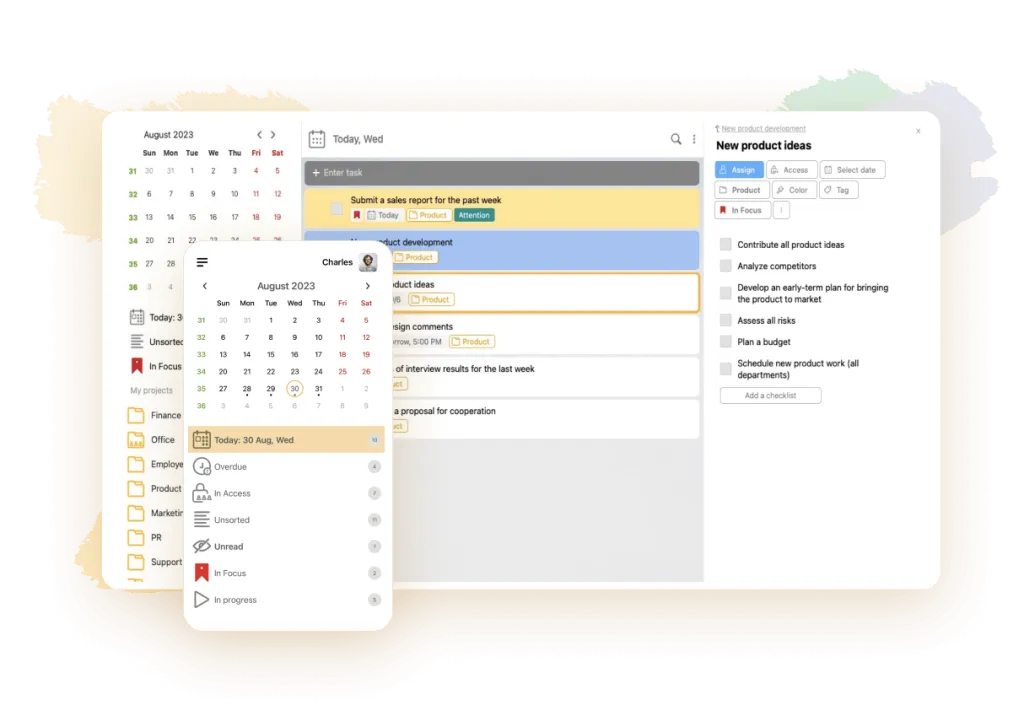
Ted Scott
December 15, 2025
According to the famous business coach Stephen Covey, the term “delegation of authority” is the highest form or element of managerial activity. According to statistics, only up to 10% of managers use their time effectively. The rest are engaged in tasks that could be delegated to others.
With the development of business, the number of responsibilities assigned to managers is constantly increasing. If you do everything without delegating it to anyone, you run the risk of burnout and chronic stress neurosis. So if you want to do serious work and accomplish great things, learn to delegate your tasks to your employees.
How to competently delegate authority to subordinates in order to increase the company’s profitability and become more successful? Let’s deal with this question in more detail.
Delegate without losing control

What is meant by the concept
Delegation is the process of transferring certain functions of a manager to subordinates. This is necessary to achieve the overall goals of the company. The essence of delegation is to determine the limits of access and responsibility of each employee. The meaning of the concept is that the manager delegates certain tasks to subordinates so that they can make better decisions in their area of competence. By assigning a task to an employee, the manager frees up time for global strategic matters related to the development of the company. The delegation of certain powers to personnel can be one-time or permanent.
The hiring interviews should be conducted by the hiring manager. Tax calculations and preparation of typical financial reports should be left to the accounting department. The use of delegation of authority will reduce the risk of deadlines on projects in the company. This will improve the efficiency of the company and all its employees.
If most of the work tasks are tied to one person, it can be dangerous for the company. If the manager is fired or becomes ill, the whole team will suffer. Therefore, it is necessary to resort to the practice of delegation. Competent assignment of tasks helps to achieve the following goals:
- Free up management resources for cases where they cannot be replaced.
- Raise the skill level of subordinates. By taking responsibility, they will be able to learn something new.
- Improve the psychological climate in the team. By understanding the motives of supervisors, workers will be more conscientious of their authority.
- Test the abilities of your staff. By assigning certain responsibilities to employees, you can assess how well they can handle them. Based on this assessment, make an appropriate decision.
- Reduce the burden on management.
- Increase the productivity of each work unit.
- Increase staff commitment to labor.
By removing unnecessary responsibilities, the manager will be able to engage in creative and strategic work that will increase the status and success of the company. With the help of delegation, quality employment of lower-level employees is ensured.
Principles and methods
Proper assignment of tasks increases the company’s efficiency by 30-40%. The following principles of delegation of authority are based on this:
- Unity of command. Assignments are delegated directly from the direct supervisor to the employee. The CEO delegates authority to the deputy. The latter gives instructions to middle managers. They delegate tasks to their subordinates. Ordinary employees receive orders from their supervisors.
- Restrictions. A supervisor may only give assignments to his subordinates. Each department head is assigned a limited number of employees. He cannot delegate a delegated task to other subordinates.
- Respect for rights and responsibilities. Employees may not perform tasks that are not in accordance with their job description.
- Assignment of responsibility. By delegating a task to a subordinate, a supervisor is not relieved of responsibility in case of its non-fulfillment.
- Transfer of responsibility. When giving an employee an assignment, the boss must be sure that he can fulfill it.
Use these simple principles of effective delegation in your team. By setting deadlines, you will be able to control the task at every stage. Choose the right person for the job. Assign tasks to those who are ready and able to take them on.
Why delegating is so hard

Delegation of tasks has disadvantages - the possibility of barriers in communication between the manager and the subordinate, if the need to delegate authority has not been defined taking into account the needs of the organization and its goals. Lack of delegation of authority can occur if the boundaries of responsibility are not defined.
There are objective reasons that prevent managers from delegating authority to their subordinates. These are:
- The desire to demonstrate oneself as a generalist. Previously it was thought that a good manager should be able to act actively on “all fronts”. And to communicate with clients, and to select goods, and to think through advertising. This model has not been used even in small businesses for a long time. Everyone should be engaged in their own business, without being distracted by secondary matters.
- Fear that workers will fail to complete a task and have to redo it. Or damage to the company. This minimal risk has a right to exist. In any case, you can avoid it altogether or minimize it by carefully choosing who to assign tasks to.
- Complexity. A person cannot be put in front of the fact that he is obliged to do this or that job. He must be trained and assisted.
The delegation of authority is carried out from the manager to one employee, which means that assigning one task to a group of executives is not allowed. When giving an assignment, it is important to describe the essence and boundaries of the task precisely so that the employee can understand his area of responsibility.
Rules of delegation
Delegating tasks implies the introduction of time management principles into the company’s management structure. In order to make the delegation process organized and successful, you should adhere to the following rules:
- Before assigning an employee to a new task, make sure he understands its nature and can handle the assignment well.
- Don’t look for a replacement. Focus on the professionals.
- Use a vertical management structure with division of the company’s main activities. Each level should have its own manager.
- Don’t be afraid to empower your subordinates. If they ask questions about a task before you do it, ask them what they would do in that situation.
- Do not try to control every little detail. This approach can cause your employees to lose initiative and responsibility. So you will take everything on yourself again and resent the fact that “no one does anything without you”. Pay great attention to this rule, because this factor can affect you both positively and negatively.
Explain the area of responsibility to the employee. He must understand which issues and tasks must be approved on a mandatory basis. What problems must be solved independently. Learn to clearly state the task, requirements, goals and deadlines. Respond if you are approached for help. By giving feedback to subordinates, you will gain credibility and respect in their eyes. For complex, large projects, set intermediate deadlines for authority.
What types of cases can be delegated

When concentration at the operational level is prolonged, degradation is inevitable. Therefore, simple and routine tasks should be delegated to lower-ranking subordinates. The time of a powerful manager or company owner is more valuable than the time of an ordinary employee. It must be managed competently and rationally.
Knowing the characteristics of organizational levels of responsibility will help in giving the right assignments to subordinates.
| The first one | Employee gathers information on his own. Suggests solutions. |
|---|---|
| Second | The employee shall make his own decision with the mandatory approval of his supervisor. |
| Third | The subordinate does everything himself. The supervisor only observes the work process. |
| Fourth | The employee presents and tells the supervisor the result of the work. The supervisor gives advice and evaluates the work. |
| Fifth | The contractor deals with the problem on his own, with no response from above. |
Subordinates can and should be assigned tasks:
- Preparatory work on the project, including information gathering, analysis of competitive advantages. Creation of a base for calling potential clients.
- Easy things to do. As an example, filling out an online store catalog or entering invoices into the accounting system. All tasks with checklists or instructions should be delegated.
- Repeat business (publishing social media posts, mailings).
- One-off tasks that do not affect the functioning of the company (organization of a corporate event).
Key parts of the business that are more complex than a routine task, important processes, risky projects, strategic or administrative tasks cannot be delegated.
LeaderTask - an effective tool for setting tasks

Delegation of authority in management cannot be called a simple process. In order to properly delegate tasks to subordinates, a manager must make decisions quickly. To take responsibility for the actions of a whole team of employees. A competent manager is able to clearly create assignments to performers and distribute them. Controls their execution at every stage. Timely makes the necessary adjustments to the task, composite tasks according to the plan and importance. Corrects errors arising during the work on the task. Gives a professional assessment of the performer’s performance.
Special electronic applications have been developed to organize project management, and we want to tell you about one of them. LeaderTask is a program that combines the functions of a daily planner, scheduler, task manager and personal secretary of the manager.
Information about projects in LeaderTask is presented by means of a single database. By structuring the tasks of the organization, you can properly assign the task to the executor. Track the progress of their fulfillment from the beginning to the end. Using LeaderTask, you will be able to:
- Organize paper and electronic documentation. Conveniently store contracts, regulations, theory, schemes.
- Schedule important deals, meetings, negotiations for a convenient time.
- Organize collaborative work on projects.
- Select the best performer to complete the task.
- Evaluate the quality and benefit of performers work.
- Receive detailed updates on project progress even when not in the office.
The app synchronizes with popular services and works on all digital platforms.
Conclusion
A good manager is a teacher who is patient with the mistakes of his subordinates and genuinely rejoices in their successes. Do not overdo it with supervision. If you constantly “stand behind the performer”, he will not be able to concentrate on the work and perform the task well, so it is important to have a good relationship with your employees.
To delegate successfully, you need to teach your subordinates to have a positive attitude and to do the job correctly. This will make it easier to develop detailed instructions. They should describe technologies, factors, and work algorithms. The performer should clearly understand what he is doing, why and for what purpose, follow these and instructions in the course of work on the task and when making decisions. Then he will successfully cope with the assigned task, and you will have time for important and strategic matters.
What is delegation of authority?

Delegation of authority is the process by which a manager assigns responsibility and decision-making power to subordinates while remaining accountable for the final results.
Why is delegation of authority important in management?

Delegation allows managers to focus on strategic tasks, improves efficiency, develops employee skills, and ensures better use of organizational resources.
What are the main principles of delegation?

Core principles include clear assignment of responsibility, appropriate level of authority, accountability, unity of command, and proper control without micromanagement.
What should not be delegated?

Strategic decisions, confidential matters, performance evaluations, and responsibilities that legally or ethically must remain with the manager should not be delegated.
How does delegation improve employee development?

Delegation builds trust, increases motivation, enhances decision-making skills, and prepares employees for higher levels of responsibility.









